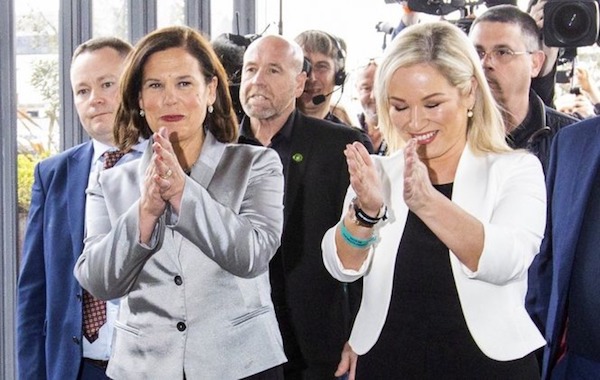
Election results across the north of Ireland show that nationalist candidates have outvoted unionists in the Six Counties for the first time, triggering a key requirement for a referendum on Irish reunification.
All 18 constituencies have now declared a first count in Thursday’s Assembly election. The results have confirmed a decline in support for unionism and increases in support for Sinn Féin and two new republican parties competing the election, Aontú and the IRSP.
Despite a decline for the moderate nationalist SDLP, the results show a historic nationalist plurality in a Six County-wide election, now outnumbering unionists by 40.7% to 40.1%.
They also point to the election of a nationalist First Minister, Sinn Féin’s Michelle O’Neill. It would be the first time the partitioned Six County statelet will be led by a nationalist.
The results also point to a historic transformation for an Irish region once claimed by Britain under threat of “immediate and terrible war”.
That was almost exactly a hundred years ago. Designed to support and sustain a unionist and almost exclusively Protestant majority, that majority has slipped away and it now no longer outnumbers the Catholic and nationalist population it once ruled over.
Under the Good Friday Agreement, Britain’s Direct Ruler must allow a border poll on Irish reunification to take place if it is likely to be passed. That point has been reached sooner than expected, advancing hopes for Irish unity in the near term.
In party political terms, Sinn Féin has increased its vote share and remains on course to become the largest party in the Stormont Assembly, under First Minister-elect Michelle O’Neill.
The party’s candidates were easily returned in all areas, many in poll-topping performances. There were also likely gains for Sinn Féin in Upper Bann and East Derry, both at the expense of the SDLP.
The cross-community Alliance Party remained on course for the most gains as the two main unionist parties, the UUP and DUP, both suffered losses. The Green Party also looked to have lost their single seat, while the hardline unionist TUV look set to gain a second MLA.
Among the most high profile eliminations so far are the DUP’s Peter Weir in Strangford and UUP stalwart Roy Beggs in East Antrim. Independent Alex Easton was elected in North Down, while People Before Profit’s Gerry Carroll was looking to IRSP transfers to hang on in west Belfast.
There was a celebratory mood for Sinn Féin as party president Mary Lou McDonald and vice-president Michelle O’Neill both arrived amid a media scrum at the Belfast count centre this evening.
She said Sinn Féin had had an excellent election, its vote had surged and it had topped the poll in several constituencies. She also spoke of the likelihood that Michelle O’Neill “will be the first nationalist, republican person to lead government here in the North.
“And remember this place was specifically designed, engineered to have a permanent unionist majority. That electoral majority has been gone now for a number of elections.
“And today, tomorrow, potentially we have a historic moment of equality, a great expression of how the North has changed, how Ireland has changed.
“And above all I would say a clear expression of how we are only going forward and not going backward and I think the DUP and [DUP leader] Jeffrey Donaldson need to hear that as well”.
Counting is to continue tomorrow across all count centres, and the key results will be published here.
RESULTS SO FAR:
Sinn Féin 29.0% (+1.1%) - 16 seats
Democratic Unionist Party 21.3% (-6.7%) - 5 seats
Alliance Party 13.5% (+4.5%) - 5 seats
Ulster Unionist Party 11.2% (-1.7%) - 3 seats
SDLP 9.1% (-2.9%) - 1 seat
TUV 7.6% (+5.1%)
Green Party 1.9% (-0.4%)
Aontú 1.5% (+1.5%)
People Before Profit 1.1% (-0.6%)
Others 3.7% - 1 seat
![[Irish Republican News]](https://republican-news.org/graphics/title_gifs/rn.gif)
![[Irish Republican News]](https://republican-news.org/graphics/title_gifs/harp.gif)

